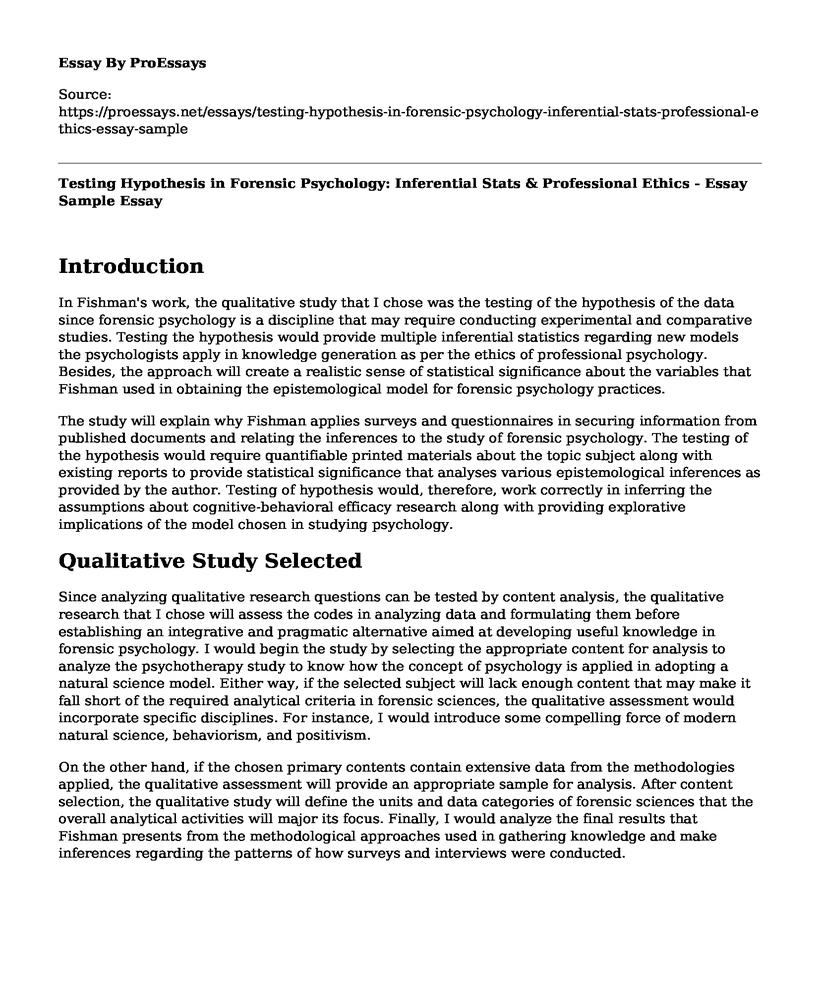Introduction
In Fishman's work, the qualitative study that I chose was the testing of the hypothesis of the data since forensic psychology is a discipline that may require conducting experimental and comparative studies. Testing the hypothesis would provide multiple inferential statistics regarding new models the psychologists apply in knowledge generation as per the ethics of professional psychology. Besides, the approach will create a realistic sense of statistical significance about the variables that Fishman used in obtaining the epistemological model for forensic psychology practices.
The study will explain why Fishman applies surveys and questionnaires in securing information from published documents and relating the inferences to the study of forensic psychology. The testing of the hypothesis would require quantifiable printed materials about the topic subject along with existing reports to provide statistical significance that analyses various epistemological inferences as provided by the author. Testing of hypothesis would, therefore, work correctly in inferring the assumptions about cognitive-behavioral efficacy research along with providing explorative implications of the model chosen in studying psychology.
Qualitative Study Selected
Since analyzing qualitative research questions can be tested by content analysis, the qualitative research that I chose will assess the codes in analyzing data and formulating them before establishing an integrative and pragmatic alternative aimed at developing useful knowledge in forensic psychology. I would begin the study by selecting the appropriate content for analysis to analyze the psychotherapy study to know how the concept of psychology is applied in adopting a natural science model. Either way, if the selected subject will lack enough content that may make it fall short of the required analytical criteria in forensic sciences, the qualitative assessment would incorporate specific disciplines. For instance, I would introduce some compelling force of modern natural science, behaviorism, and positivism.
On the other hand, if the chosen primary contents contain extensive data from the methodologies applied, the qualitative assessment will provide an appropriate sample for analysis. After content selection, the qualitative study will define the units and data categories of forensic sciences that the overall analytical activities will major its focus. Finally, I would analyze the final results that Fishman presents from the methodological approaches used in gathering knowledge and make inferences regarding the patterns of how surveys and interviews were conducted.
Differences and Similarities of the Studies
Analyzing data through quantitative studies avails an enormous range of inferences as a result of multiple sub-disciplines of forensic psychology that it assesses. The assumptions regarding the discipline relate to most psychological parameters in the research process, which in turn make the resulting analysis to provide a larger sample size. Besides, the data analysis approach by the qualitative process provides typical values derived from behaviorism and natural science methodology. They directly compare to the previous centuries of a philosophical view of logical positivism in forensic sciences. On the other hand, the qualitative study primarily analyzes the sub-primary disciplines of psychology that aim at facilitating social interaction despite the participants' direct engagement in the research process or not. The similarity is that all the assumptions in both the studies must be connected to the primary parameters of forensic psychology to establish adequate data in the final stages.
Conclusion
From the comparison, it is clear that the original idea in postmodernism is social constructionism since it assumes the underlying prepositions by various individuals, as revealed by the hypothetical inferences established. The substantive cross-case analyses provide clear deductions of particular cases contained in the forensic science databases.
Reference
Fishman, D. B. (2005). Editor's introduction to PCSP: From single case to database: A new method for enhancing psychotherapy practice. Pragmatic Case Studies in Psychotherapy, 1(1), 1-50. http://ejbe.libraries.rutgers.edu/index.php/pcsp/article/view/855/2167
Cite this page
Testing Hypothesis in Forensic Psychology: Inferential Stats & Professional Ethics - Essay Sample. (2023, May 12). Retrieved from https://proessays.net/essays/testing-hypothesis-in-forensic-psychology-inferential-stats-professional-ethics-essay-sample
If you are the original author of this essay and no longer wish to have it published on the ProEssays website, please click below to request its removal:
- Vaccines are Linked With Autism Essay
- The Growth of Social Gerontology Essay
- Essay Example on H.G. Wells's The Pearl of Love: Love, Loss, Devotion & Obsession
- Living Better: My Quest to Find Solutions to the World's Problems - Essay Sample
- Annotated Bibliography Sample on Mobile Phones and Social Interaction: A Comparative Study of University Students
- Mental Illness and Homelessness - Free Report Example
- Mental Health Consultation Essay Example







